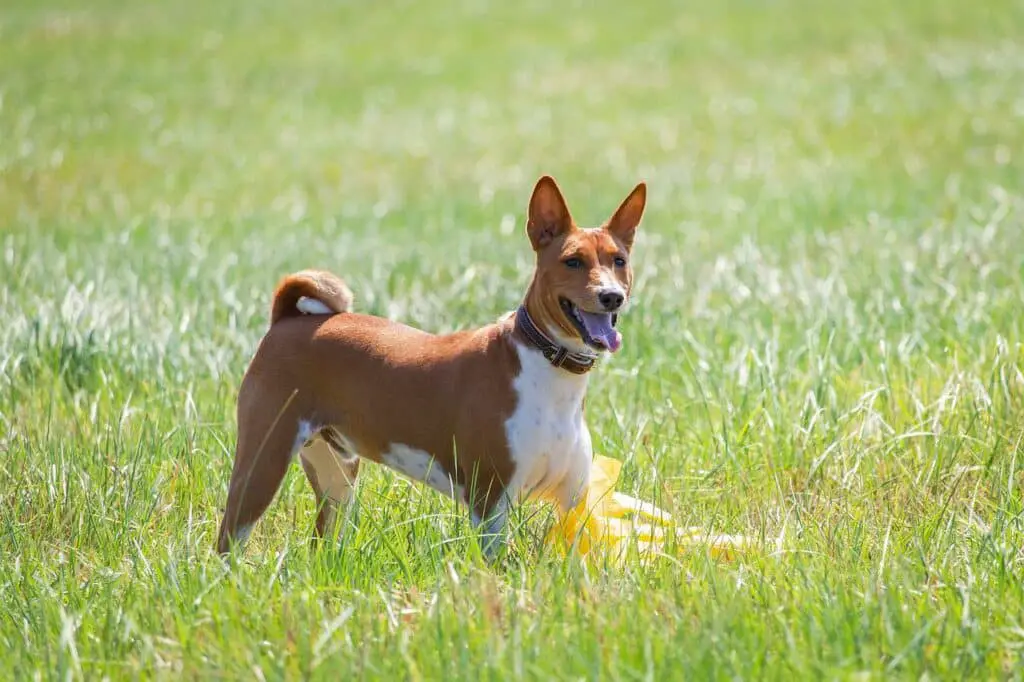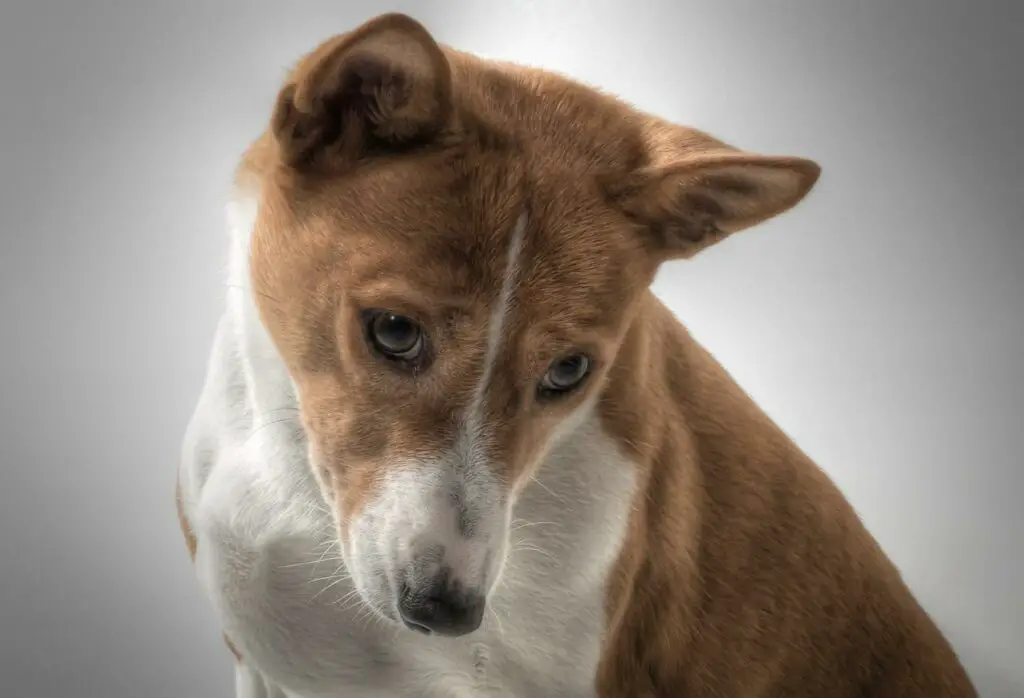Basenjis are excellent hunting dogs that use both scent and sight.
Most people want to own these dogs due to their hunting accuracy.
Before owning a basenji, you may want to know if they shed due to the menace of finding dog hair all over your house.
So, do Basenjis shed?
Yes, like other dog breeds, Basenjis shed throughout the year.
However, they are a low shedding breed that sheds more in seasons like spring.
Before owning a Basenji, it’s necessary to know how much they shed and the factors that affect the shedding.
Furthermore, you need to know how to minimize the shedding. Keep reading to find out.

How Much Do Basenjis Shed?
The coats of Basenjis make them light shedders.
These dogs have light coats with short, sleek, and glistening hairs.
They also have a dense undercoat that nourishes the hairs, keeping them firm.
With short hairs firmly held by the undercoat, Basenjis don’t shed as much as dogs with longer fur.
Nevertheless, they are still susceptible to seasonal or hormonal changes that result in heavy shedding.
It’s also worth noting that some Basenjis will shed more than others due to hormonal variations.

Factors That Affect How Much Basenji Sheds
The five primary factors that affect how much your Basenji sheds are:
- Health
- Season
- Nutrition
- Allergies
- Undercoat
Health
The health of your Basenji significantly determines how much he’ll shed.
If your dog is healthy and has a strong immune system, he will shed less.
On the other hand, if your dog is sickly, he’ll probably shed more due to poor coat health.
Some sicknesses like Cushing’s disease, hypothyroidism, and bacterial infections increase shedding in dogs.
Your pup might be sick if you notice an increase in his shedding with signs like lethargy and loss of appetite.
Season
Seasonal changes are a way by which canines prepare for temperature changes.
Basenjis shed more as they approach spring in preparation for warmer temperatures.
You’ll also notice an increase in shedding as autumn draws near because that’s when these dogs start growing their winter coats.
As the temperature increases, the coats eliminate the thicker undercoat that kept the dog warm in winter.
The dog will develop fluffy fur prone to shedding, and you must be prepared for it.
Your house will have more hair than any other time.
Nutrition
A poor diet is one of the significant contributors to excessive shedding in canines.
Dogs need a well-balanced meal with all the nutrients required for healthy growth.
If your Basenji isn’t getting enough protein, omega-three fatty acids, and vitamins, the shedding will be worse.
A lack of these nutrients leads to dry and brittle hairs that fall off easily.
You can improve your Basenji’s diet by adding supplements rich in omega-three fatty acids, proteins, and vitamins.
You should also feed him food rich in these nutrients like chicken, eggs, sweet potatoes, and carrots.
Allergies
Like humans, dogs can suffer from allergies that cause excessive shedding.
Allergies are often caused by food, pollen, or dander.
If your Basenji is allergic to these things, he’ll be irritated with itchy skin.
The irritation and itchy skin will cause him to scratch, and the shedding will worsen.
The best way to identify whether your dog has allergies is by taking him to the vet for diagnosis.
The vet will use either RAST or intradermal tests to determine if the dog is allergic to any food.
Undercoat
The undercoat of Basenjis is essential in keeping the top coat healthy.
The undercoat has a dense network of hairs that hold the top coat in place.
It also has oils that moisturize and nourish the skin.
If the undercoat is healthy, the top coat will be firm, and shedding will be minimal.
However, if the undercoat is unhealthy, the skin will be loose, and shedding will be excessive.
How to Minimize Shedding in Basenjis
As a BAsenji owner, you want to minimize his shedding as much as possible.
Excessive shedding makes the house untidy. You can do this by:
Brushing the Dog
Brushing removes dead hairs and stimulates the growth of new ones.
It also distributes the oils evenly, which keeps the coat healthy and moisturized, minimizing the shedding.
Brushing the dog at least once a week is enough to remove the dead hairs and promote a healthy coat.
Use a soft bristle or rubber brush to prevent over scratching the skin.
Use a damp cloth to wipe over the coat after brushing.
This is to catch any remaining hair that can drop in the house.
Feeding Them a Healthy Diet
As earlier mentioned, nutrition is essential in minimizing shedding.
A well-balanced diet with the necessary growth nutrients like proteins will keep the coat healthy and reduce excessive shedding.
You can also supplement their diet with omega-three fatty acids, proteins, and multivitamins.
Bathing
Basenjis only need bathing when necessary because over-bathing strips their coat of the oils that keep it healthy.
Bathe your dog only when he’s dirty or smells bad.
Use a mild deshedding shampoo and conditioner to loosen the dead fur.
After bathing, use a towel to remove excess water and hair from the skin.
Frequently Asked Questions
Do Basenjis make good pets?
Yes, Basenjis make good pets.
These dogs are intelligent, loving, and easy to maintain.
Therefore, they make good pets for companionship.
Do Basenjis have a lot of dander?
No.
Basenjis are low-dander dogs considered low-shedders.
This dog breed is also an excellent one as they groom themselves.
Thus, you’ll not have to clean him regularly like other dogs.
To Sum It Up
Basenjis are light shedders but may shed more due to health conditions, seasonal changes, poor nutrition, allergies, or an unhealthy undercoat.
You can reduce the amount your Basenji sheds by brushing him regularly, feeding him a healthy diet, and bathing him with a deshedding shampoo.
Feed your Basenji proteins, vitamins, and phosphorus-rich diets for a healthy coat that sheds less.
You’ll notice a reduction in the hair dropped in the house if the dog gets a balanced diet.
- What Dog Breeds Have Pink Skin? - March 24, 2023
- What Are the Most Inspiring Dog Breeding Quotes? - March 20, 2023
- Can Pheromone Spray Help Improve Dog Breeding Results? - March 19, 2023








